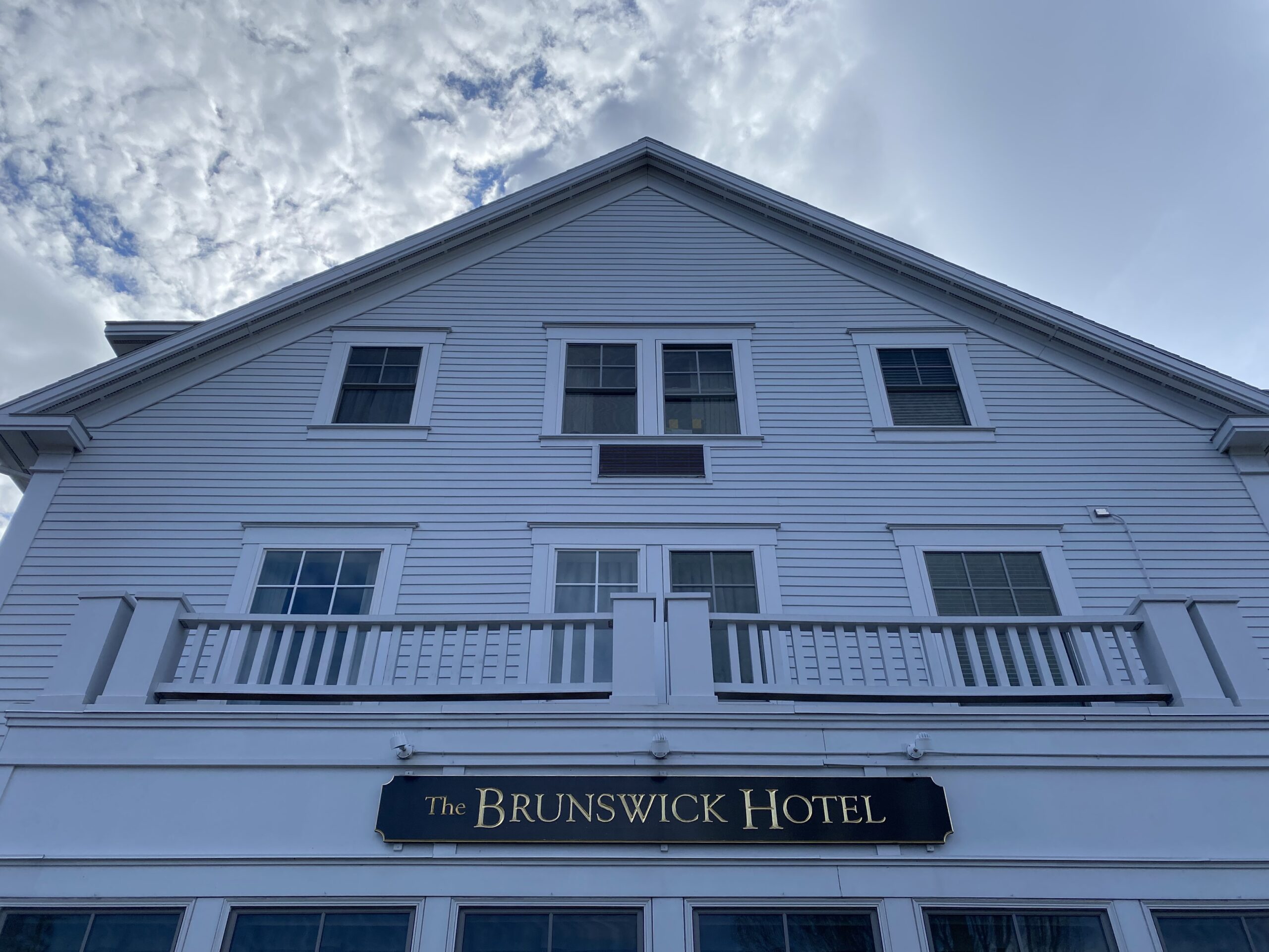Students living in the Brunswick Hotel reflect on an isolated semester
May 7, 2021
 Sophia Wei
Sophia WeiThe Brunswick Hotel and Tavern has housed 47 first-year students this semester as part of Bowdoin’s plan to secure single rooms for all students needing on-campus housing this spring.
The students entered the semester with varying levels of connection to their neighbors: some had met over winter break, and some were core group mates from the fall. Others, however, went in relatively blind, making it difficult to form a pod.
This meant that many students were struggling in the first few weeks of the semester, as COVID-19 guidelines were stricter and students were not able to socialize to meet others in the Hotel. Ilana Fernandez ’24, an international student from Singapore, explained that she did not know all but three of the people she crossed paths with to get meals or tested during those first weeks on campus.
Joosep Vorno ’22, a proctor assigned to the hotel, said that it was initially unclear what his role as a proctor in the Hotel would be. Students in the Hotel, Vorno explained, were assigned proctors in the fall with the expectation that programming would be continued through the spring semester remotely.
“[Initially,] we were more just an extension of ResLife on campus, if, [for example] they needed someone to come and … open the door for them,” Vorno said in a Zoom interview with the Orient.
As time went on, Vorno said, students took the initiative to start planning social events—whether it was gelato runs or Mario Kart game nights. Vorno said he appreciated the efforts of his proctees and jumped in to support their programming. First-year students appreciated the efforts made by Vorno and the other proctor assigned to the hotel, Daniela Quezada ’22.
“Part of my experience [on campus has been] shaped by proctors, and I think they did a very good job,” Bryant Ung ’24, an international student from Cambodia, said in a Zoom interview with the Orient.
Di Phung ’24, also a resident of the Hotel, went on regular walks with Quezada, which helped her feel less isolated on campus.
“During the time I felt the most lonely and isolated and … overwhelmed in the beginning of March, [Quezada] was there for me,” Phung said in a Zoom interview with the Orient. “I think that really helped my mental health.”
Despite efforts to build community, Hotel residents noted a sense of exclusion from the rest of campus, especially from upperclassmen, and the Hotel’s physical distance from many buildings on campus only adds to this divide.
“I would say [the Hotel] is pretty far from campus, so definitely the commute back and forth gets tedious,” Sara Morcos ’24 said in a phone interview with the Orient. “It’s hard because you can’t go five minutes before class to grab your meal—that’s something I have to schedule or think about.”
This physical distance often prevents Hotel residents from venturing to other parts of campus where they might find social opportunities.
“I don’t necessarily feel the motivation always, especially in bad weather, to go walk on the other side of campus,” Morcos said. “[The distance] makes it hard to connect with people and to see students unless you see them in passing or go to events toward the other side of campus, [since] no students come toward the Hotel.”
COVID-19-related restrictions on social gatherings have heightened this sense of distance, with many first years having few opportunities to meet upperclassmen.
“The Hotel is quite isolated from everyone else,” Ung said. “We sort of do our own thing, and [upperclass students] also do their own thing, and it’s not like there’s any event[s] that people invite others to because of COVID[-19] restrictions.”
Not all residents have had an interest in physical programming, which is another obstacle to building community.
“Not everybody is interested … right now, because of various reasons. Some people are just really swamped with work. [Others] are really concerned about COVID-19, so they are taking a step away [and are] more interested in remote [programming] with their remote proctors,” Vorno said.
Success in programing, engagement and mental health has varied based on residents’ relationship to their fall proctors. For some, like Bhadra Mishra ’24, their remote proctors have planned game nights. Others, however, have not felt the same level of support.
“I’ve only really kept contact with … members of my core group that are on campus,” Fernandez said. “I feel like on campus now, I’m busy with classes and then also busy with the people here, so I have not been able to keep in contact with [a lot of] people.”
Warmer weather, however, has provided residents with opportunities to engage with upperclass students that many have never interacted with before.
“[The May 1 Celebration] was actually the busiest I’ve seen campus ever. The pictures don’t do it justice … It was the first time I’ve seen how big the Bowdoin community is,” Fernandez said.
Despite its challenges, residents of the Hotel have found many benefits to their unconventional living arrangements.
“It doesn’t give a college dorm-like atmosphere here, but I really can’t complain because the living conditions are very good compared to other dorms,” Ung said.
In addition to accommodations, residents are thankful for the opportunity to connect with members of their class through their housing in the Hotel.
“We’re a pretty big and diverse group of students, and it’s been really nice to meet new people,” Morcos said.
Danielle Quezada ’21 is a member of the Orient staff.

Comments
Before submitting a comment, please review our comment policy. Some key points from the policy: